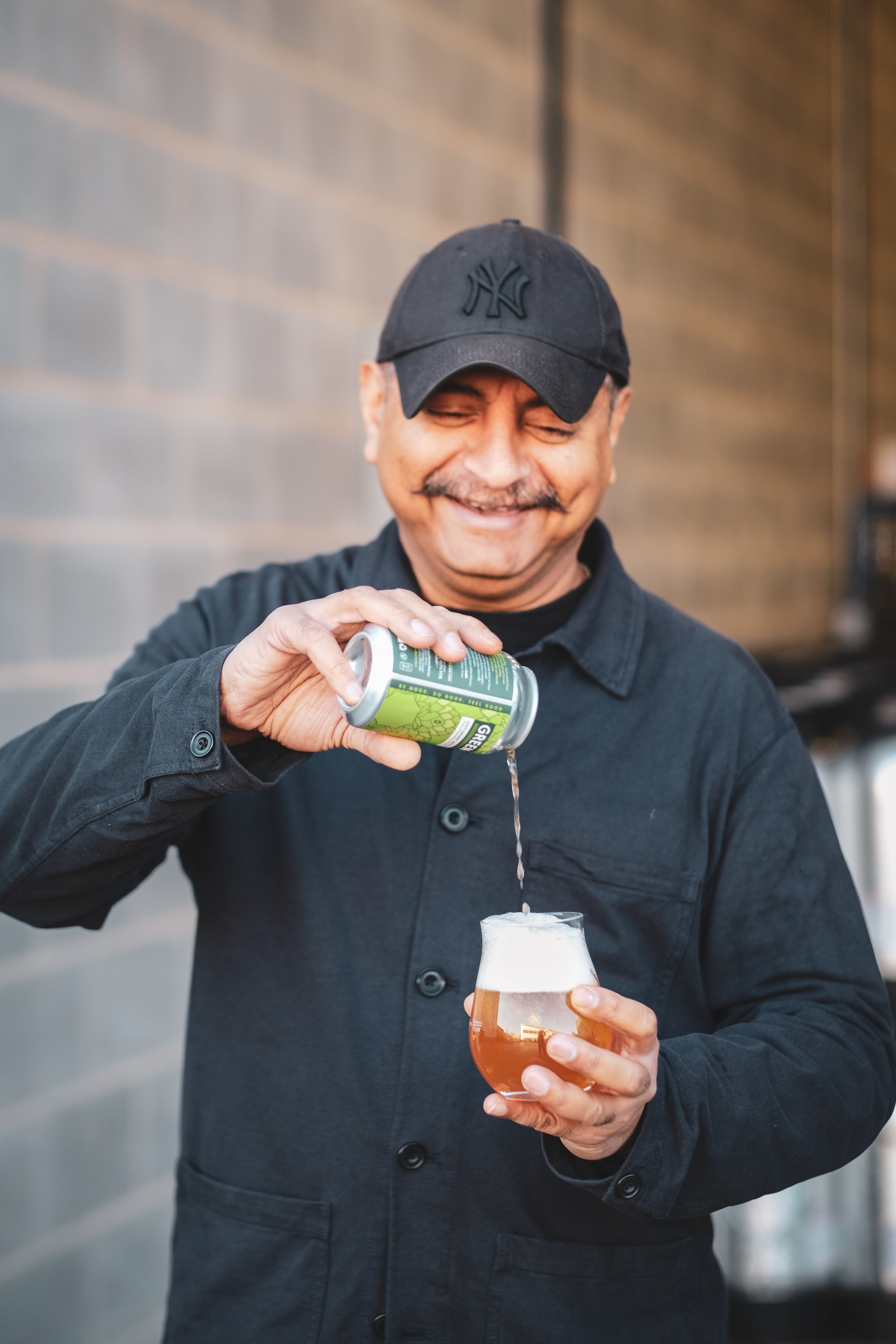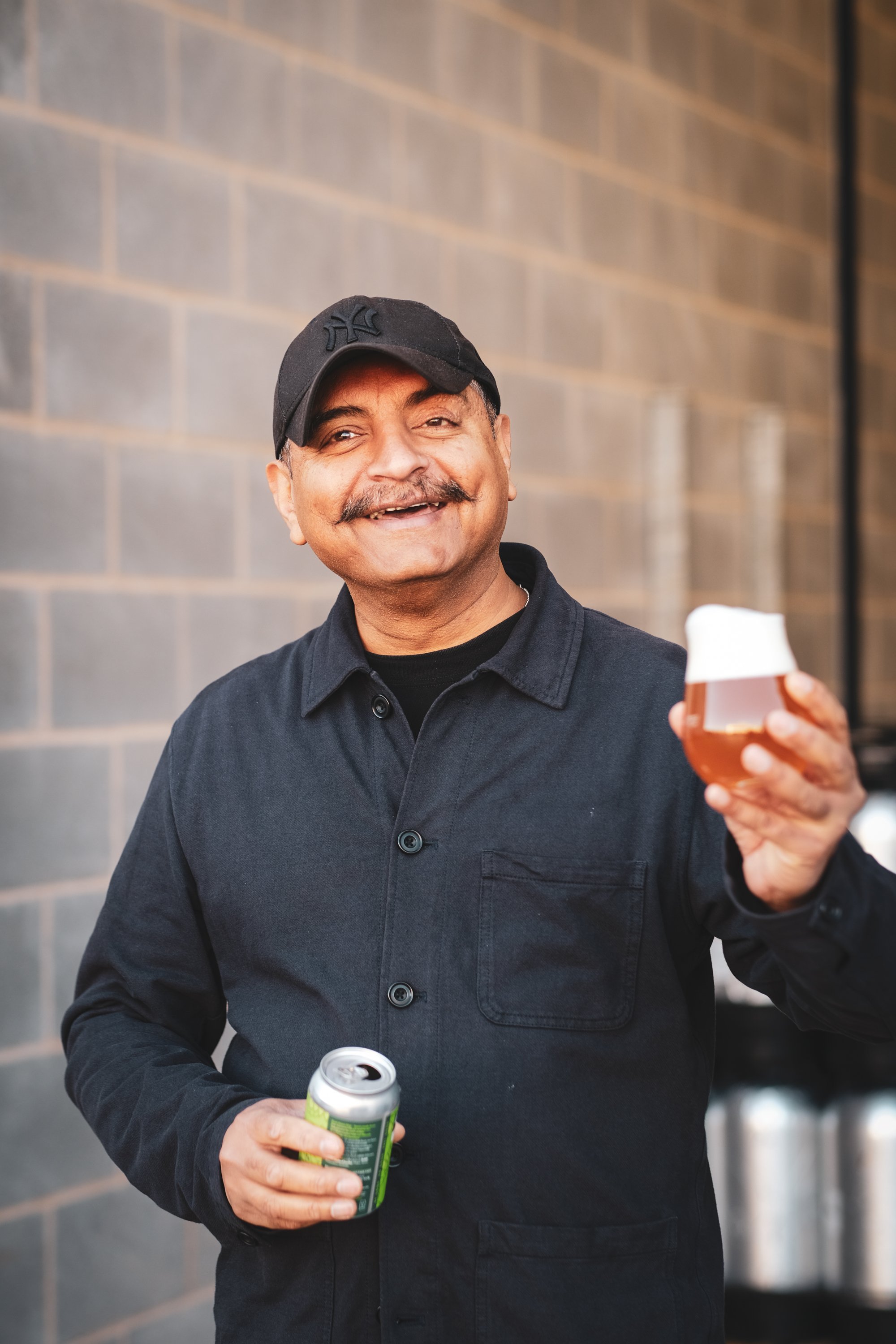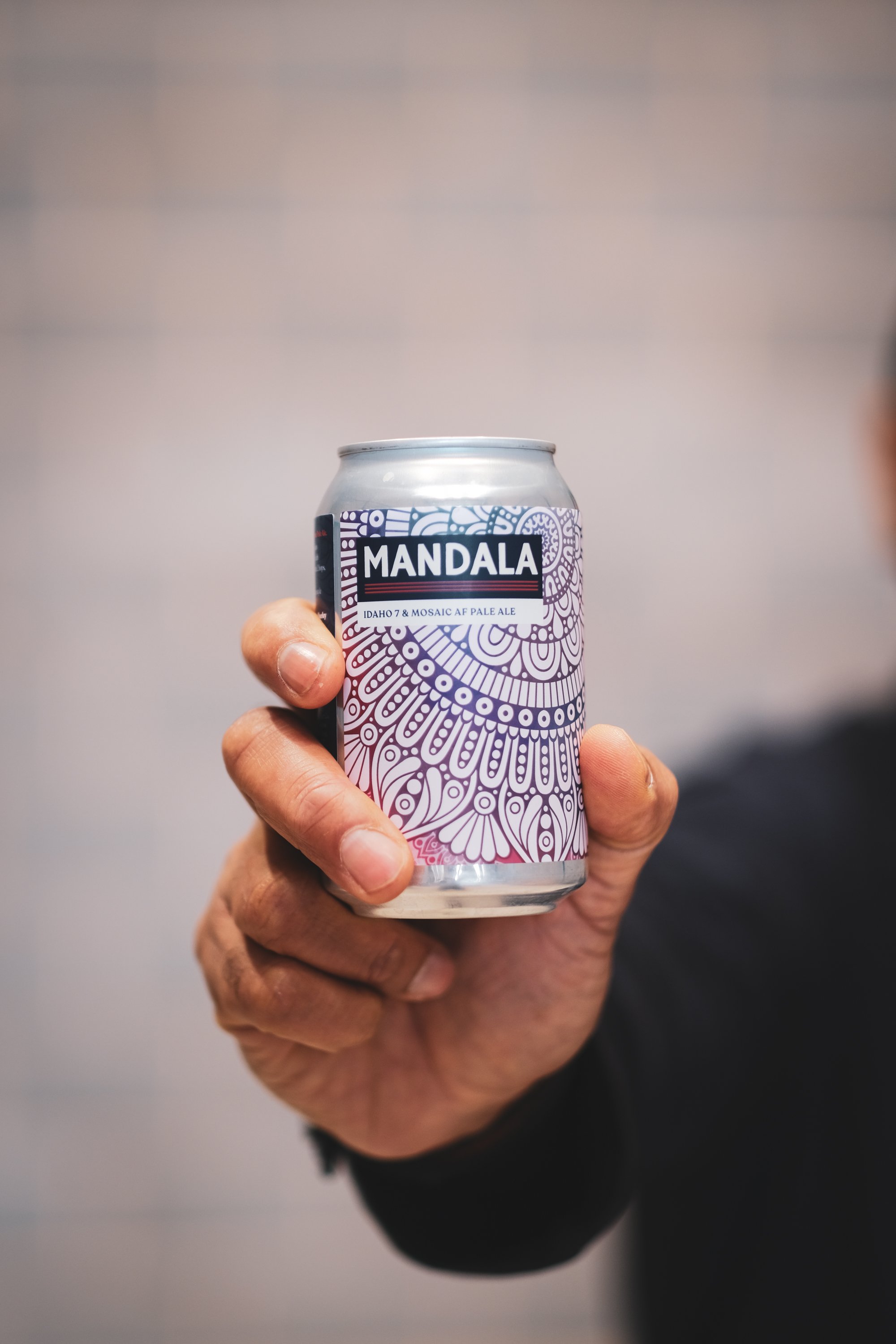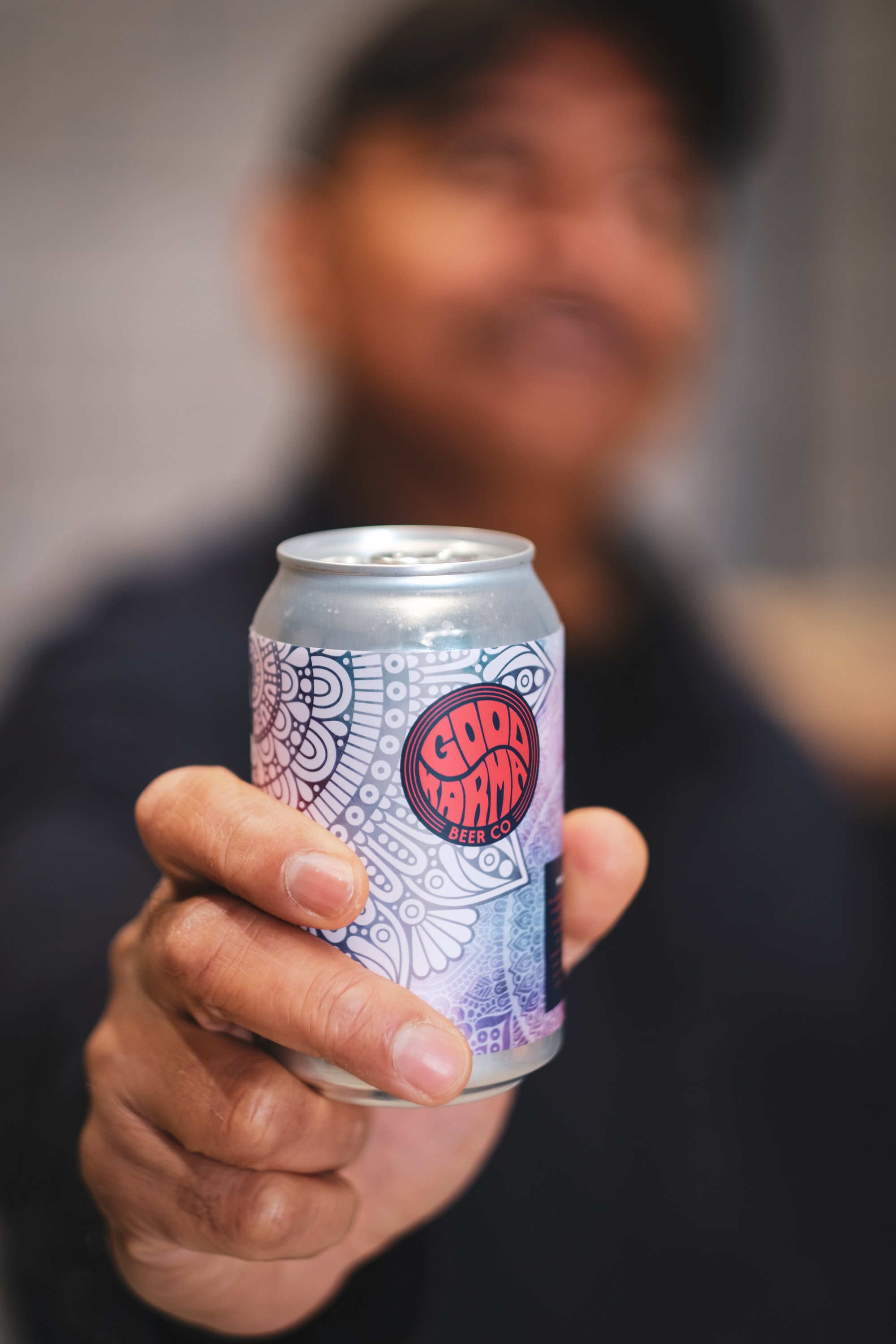We All Shine On — In Conversation with Steve Sailopal of Good Karma Beer Co.
If you asked for an alcohol-free beer in your local 30 years ago, at best you’d have got a strange look, at worst, you’d have been laughed out the door. But today, thanks partly to the Covid-19 pandemic and the rise of wellness culture, alcohol-free beer is having its time in the sun. In January 2022 a record 131,266 people signed up for the annual Dry January campaign, and Generation Z—anyone born between 1997 and 2012—are reportedly drinking less booze than the generations before them.
Photography by Lily Waite
The majority of pubs and breweries in the UK now serve alcohol-free drink options, from craft beer to artisanal gin. According to the International Wines and Spirits Record’s (IWSR) No-and Low-Alcohol Strategic Study 2021, sales are set to rise by a further 31% by 2024. It’s no wonder then, that big breweries from globals like Heineken to regionals such as Adnams are getting in on the act.
Back in 2016 though, the alcohol-free (AF) movement as we know it today was still in its infancy, which makes Steve Sailopal one of its trailblazers. That year Steve co-founded alcohol free producer Nirvana Brewery, in Leyton, East London, before ill health forced him to take a step back. Steve sold his share of the business in 2018 and suddenly found himself distanced from the brand he’d helped build from scratch.
Not one to sit back and feel sorry for himself though, Steve decided to set up a new alcohol-free brewing company, Good Karma Beer Co., which he founded later that same year. He operates as a contract brewer based in his newly adopted home of Canterbury, Kent, creating small batches and often working in collaboration with other breweries such as Manchester’s Cloudwater, and London’s Pretty Decent Beer Co. The most recent of these is Halftime Oranges, an alcohol-free IPA produced with another itinerant brewer, Match Day Brewery. Created in response to the tragic death of his friend, graphic designer Laura Archer, 10% of this beer’s profits are going to Mind, the mental health charity.
All of Good Karma’s beers are alcohol-free, which means they contain no more than 0.5% Alcohol (the legal limit within the UK for declaring a beer as alcohol-free.) The brewery’s lineup includes Shanti, a cherry sour that delicately balances sweet and sour notes with an earthy undertone, and Mandala, an Idaho 7 & Mosaic Pale Ale, with a distinct sweetness and body in the finish. There’s usually a deeper story behind every can too, with beer names often paying homage to Steve’s Punjabi heritage.
I met Steve at the Signature Brew Taproom in Walthamstow, North London, to discuss the growth of the alcohol-free sector, his hopes for low-attenuation yeasts and hop extracts and the importance of good karma.
***
Nichola Daunton: How did you get involved in the beer industry?
Steve Sailopal: It all started in 2007. Before that my family were in the clothing industry. My dad came over [from India] in 1957, he was a tailor for the British Army, and he started a fashion company which used to make for the likes of River Island—Chelsea Girl in those days—and Topshop. It was mainly contract manufacturing, and we were involved in that for quite a long time. And when my father passed away, a friend of mine, who I used to buy lace from in Lille, said “There’s a Belgian brewery who want some help with marketing, how about you do that?”
I wasn’t a Belgian beer drinker at the time, but I went there and the guy handed me a glass of Orval and, well, a light came from the chalice! I helped them rebrand their products and distribute their beers over here—I did that for about five years.
Then, sadly around 2014, a friend of mine passed away due to alcohol abuse, and that really got me, because we were drinking buddies, and shortly after my mum passed away as well. I took time out and went to India, I went to the Himalayas, and then came back and discovered the mindful drinking movement.
ND: When did you brew your first beer, and was it alcohol-free?
SS: Before I started the brewery, a friend lent me a 100-litre pilot kit, and I brewed an alcohol-free stout. I took two bottles of that to Laura Willoughby, who runs Club Soda. Laura was making a lot of noise about AF drinking and I thought, you know what, we need alcohol-free beer, it’s not just about kombucha.
““I thought, you know what, we need alcohol free beer, it’s not just about kombucha.””
The weird thing was though, all of my friends in the industry, when I told them I was getting into alcohol-free, they said, “Steve, have you bumped your head? Why would people want alcohol-free beer?” I told them to take it seriously but they were like “Nah, nah, nah. Steve, you’re doing something wrong, don’t waste your money.”
Those same people are making alcohol-free [beer] now.
ND: Alcohol-free beer is booming at the moment, and we’re seeing huge growth in the industry. What do you think is driving this?
SS: It’s definitely growing because it’s not just people on the wagon drinking it now. Everyone else is enjoying alcohol-free as well because it doesn’t taste crap anymore. It doesn’t taste nasty like it did in the Kaliber days.
Because of the better taste profile, the better malt bill, craft drinkers are accepting it, which is really helping, and there’s growth in the mindful drinking sector too. People are more conscious of how much they’re drinking. While those on the wagon are looking at the AF industry and saying “okay, it’s safe for us to drink this.”
But while we want Joe Public to drink alcohol-free beer, we need to be careful how we market our products to people who don’t drink alcohol. You don’t want people on the wagon to think “I can knock back a couple of 0.5%’s, so now let me try 2%, let me try 3%.”
I think it’s very important for alcohol-free brands to be aware of this, you don’t want to be in your face or loud. We don’t want anyone to fall off the wagon. Temptation is huge, so you’ve got to be very, very careful.
ND: There’s still a lot of stigma surrounding alcohol-free beer. Whether that’s because people assume it doesn’t taste nice, or there’s peer pressure from friends to drink alcoholic beer instead. How are you working to overcome that?
SS: In London, I don’t think we’re seeing that pressure anymore. While I was at the bar there was actually a young woman asking for an alcohol-free beer too.
Up north maybe—I’m not saying “how the north are in comparison to soft southerners”—but it may be that sort of an attitude. But the industry is growing, I mean look at Cloudwater, they’re doing the Cloudwater Soda. So I think we’re actually over that, I think we crossed that about a year ago.
ND: Do you think lockdown was the turning point?
SS: Yeah, I think lockdown had a huge part to play in the growth of alcohol-free and mindfulness. Because of the virus, we were so concerned with our well-being, we wanted to know what we were drinking, where it was coming from.
I know from speaking to a lot of alcohol-free brewers that they made a lot of online sales during that time. I mean, you don’t want to be doing a zoom meeting off your nut, you know?
ND: How does the brewing process differ with alcohol free beer when compared to alcoholic beer?
SS: The process is pretty much 99% the same. But what we have now, which we didn’t have when I started, is all these low attenuation yeasts. When I started, I was brewing with Windsor [a popular brewers yeast strain] and then stopping fermentation, and the beer was tasting really watery. But now, with these new yeasts that are available from Belgium and Germany, we’re able to create a good grain bill.
““Lockdown had a huge part to play in the growth of alcohol free and mindfulness.””
The other thing we’re noticing is that there are more hop extracts available now, which we can play around with to create a better sensory profile. Because of the lack of alcohol in AF beer, adding hops can cause microbiological issues. I was always worried when I used to dry hop. So now, I try to dry hop with hop extracts, so the product is safer.
ND: You made the decision to work with Cloudwater on their ‘Beers with big ideas’ project, so your beer was brewed by BrewDog for Tesco. How did you come to that decision, and would you do it again if offered the same opportunity?
SS: If the opportunity came again, I would [still] do it. And I’m sure Paul [Jones] at Cloudwater would look at who would make the beer. Because last time, sadly, BrewDog had issues—with what we saw on TV and read on Twitter—and they were producing the product.
Maybe Paul will look at it again and somebody else will brew it. I’d love to be part of it and not just because I got my beer into Tesco, but because consumers saw that there is an African brewer, an Asian brewer, and an LGTBQ+ brewer, which you’d never seen [in a supermarket] before.
I went on Twitter when it was released, and so many people were saying “Oh I never knew there was an Asian brewing company.” Because a lot of Asians are on the other side of the bar, they’re drinking it, or they’re working in off licences, selling it.
ND: You are doing contract brewing at the moment, do you want to stay that way or do you want to have your own brewery again someday?
SS: You know what, I had the opportunity of getting an investor in, but once bitten, twice shy, and I’m scared. I was literally crying my eyes out when I left [Nirvana], because I created it, I literally put the brewery together.
The challenge I had creating Good Karma was that I had put all my creative and physical energy into building that other brand. But then I thought, I need to look at it from another angle and try to continue what I would have done then, and what those people are going to miss. Investors cannot be creative directors.
So, I’ve got a friend of mine in Kent who I’m doing small batches with, and if anyone else pops up, we’ll see. But I’m happy with this at the moment.
ND: What does Good Karma mean to you?
SS: If you give out good vibes, you’ll get good vibes back. There are people out there who karma will deal with in its own way, and I’m going to let karma deal with them.
Whereas Good Karma is about positivity, sending out positivity, getting back positivity, because it’s your actions that affect others and it’s so important that we choose to do the right thing.
Good Karma was created in three months, in August 2020, after a constant barrage of texts from Stacey [Ayeh] at Rock Leopard, Paul [Jones] at Cloudwater, and a few others saying “Steve, you need to get back into it mate.” I’m still so humbled at the way people have helped me.




























